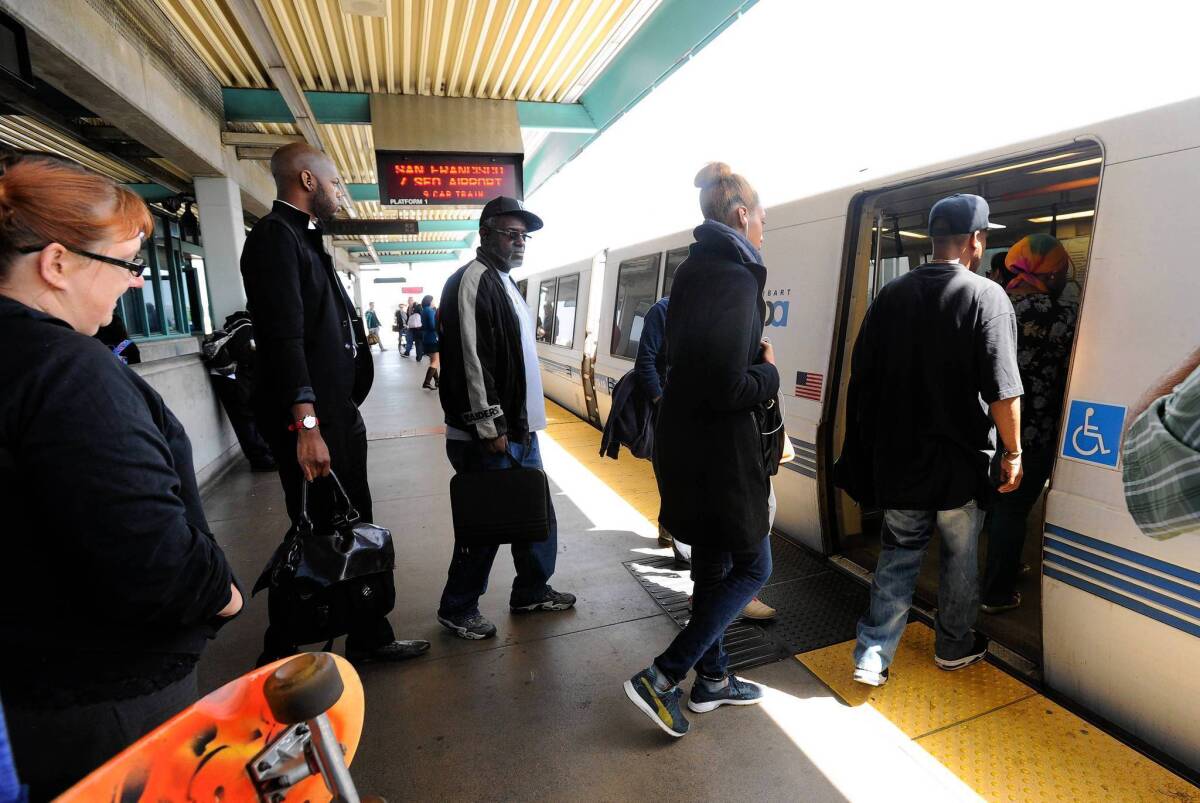BART rumbles back to life, but commuters still feel a bit derailed

- Share via
SAN FRANCISCO — When commuter trains rumbled back to life here Friday afternoon after a crippling five-day strike, the mood was less than jubilant.
Those unfortunate Bay Area residents who didn’t get a post-July Fourth day off did return to the comfort of routine after a week of transit acrobatics that involved buses, carpools with strangers, cabs and ferries (a pretty ride for a pretty price, under crowded conditions).
Still, as workers trickled into the Financial District’s underground Bay Area Rapid Transit station after the heralded 3 p.m. resumption of service, they seemed downtrodden.
“I’m just exhausted and drained,” said Consuelo Lopez, 32, of Oakland, a makeup instructor who sat cross-legged in the Embarcadero station with fellow teacher Keaghlan Ashley, 23, of Alameda, waiting for a train. “It’s the stress of trying to get to work on time, of everyone upset.”
The return to normalcy may be temporary: BART management and its two largest worker unions remain far apart on key issues but agreed to extend the existing contract through Aug. 4 as negotiations continue.
Even so, there was a collective sigh of relief Friday as the news sank in that trains would once again run on BART’s 104 miles of track, carrying an estimated 400,000 weekday riders.
“Thank God,” 21-year-old Mary Miers said of the reprieve as she waited for an express bus from Oakland to San Francisco late Friday morning — and gritted her teeth when a full one blasted past without stopping. “This has been a horrible week.”
Miers missed her paid internship at a San Francisco real estate office, as she had Monday through Wednesday when a parade of overstuffed buses passed her by. All told, she lost about $200 in income.
She was able to get to her afternoon job at a downtown San Francisco Starbucks earlier this week, but it took about 2 1/2 hours to do so. And when she arrived at the coffeehouse, “it was the emptiest I’ve seen it,” she said.
Her experience offers a glimpse into the economic punch that the first BART strike in 16 years dealt to San Francisco businesses as plenty of commuters and workers stayed home. A regional business group estimated that the cost to the local economy in lost work time, extra fuel and reduced spending was hundreds of millions of dollars.
BART workers have raised safety concerns during the negotiations, but the stickiest bargaining points involve money: Employees represented by Amalgamated Transit Union Local 1555 and Service Employees International Union Local 1021 have sought raises of about 21% over the first three years of a four-year contract. Management has offered 8% over four years.
BART also wants employees to contribute to their pensions — they currently do not — and increase their healthcare contributions, which are set at a flat rate of $92 per month, regardless of the number of dependents.
In a statement, BART General Manager Grace Crunican thanked Marty Morgenstern, secretary of the California Labor and Workforce Development Agency, and his mediation team “for all their help and support in crafting this deal, which will allow us to continue bargaining while running the trains.”
But, she warned, “we still have a wide gap of disagreements to bridge over the next 30 days.”
In an interview, ATU Local 1555 President Antonette Bryant said her union was willing to give negotiations “a last-ditch effort” out of concern for the riding public. And SEIU 1021 President Roxanne Sanchez said in a statement that employees “are working diligently to quickly reach a resolution,” but she singled out “BART’s high-paid, out-of-state negotiators” for choosing to “stall and bargain through the media, consequently leaving hundreds of thousands of Bay Area residents stranded.”
Ashley, the makeup instructor, said she supported the calls by BART workers for increased security. (She was robbed not long ago and, like many people in the Bay Area, watched a recent viral video of a combative naked acrobat at a San Francisco BART station.)
When it comes to salary and benefit demands, however, even those who consider themselves union sympathizers seem conflicted.
“We don’t even have healthcare benefits,” Ashley said.
One thing is certain. The strike, she said, “shows how vital this transit system is.”
More to Read
Sign up for Essential California
The most important California stories and recommendations in your inbox every morning.
You may occasionally receive promotional content from the Los Angeles Times.










